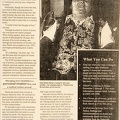SPINAL COLUMN p.22
[Headline] On Their Own
[Subheading] People with disabilities don't belong in Institutions
by Alan Friedman
Edwin McWilliams is considering pursuing a career in the ministry or perhaps owning an electrical supply business.
Meanwhile, Linda Stinson Worley, is running for office as a candidate for state representative.
Goals such as these would be considered ambitious under any circumstances. But for both Edwin and Linda, the pursuit of these goals is testimony to how the effective use of health care resources can empower people with disabilities.
In 1980, 19-year-old Edwin McWilliams was severely injured when the car he was driving slammed into a telephone pole near his Macon home, leaving him paralyzed from the neck down and dependent on a ventilator to breathe. Linda Stinson Worley is quadriplegic as a result of a virus that struck more than 20 years ago.
Edwin and Linda have been given a second chance at living independently thanks to Georgia's Medicaid lndependent Care Waiver Program (ICWP).
The state's independent care legislation was established in 1992, the result of efforts by Shepherd Center and local disability rights advocates to convince law makers that Medicaid funds could be more effectively spent on helping severely disabled people live independently, rather than paying for their care in nursing homes and long-term care facilities In some cases, attendant services at home are less expensive than the same services in a nursing home.
In 1991, $105,000 was approved to fund a pilot independent care project for a half-dozen people. The following year, funding for the program was expanded to $1.2 million. Today, $5.6 million in state and federal funds allow l l2 disabled
Georgians to get the assistance they need at home. Presently, there are 200 people on a waiting list.
The 1996-97 increase is due in large part to Governor Zell Miller's budget redirection plan; that plan requires each state agency to trim its budget by five percent, and some of the money saved is being redirected to specific state projects. Edwin's acceptance into the ICWP in July 1995, helped end a crisis for his family, and especially his sister, lune, who lives nearby.
Alter his rehab at Shepherd, Edwin returned home to live with his mother who provided him with 24-hour-a~day care for 14 years. 1n 1994, she was diagnosed with cancer, and she passed away earlier this year.
When his mother became too ill to care for him, Edwin moved in with lune, who assumed his care. But the full-time demands weighed heavily on her, her husband and their two young daughters now ages six and two.
Photo: A woman in a flowery button up shirt sits in a wheelchair with tubes coming off the side. Her head is back and her arms extended on the armrests and she is smiling slightly.
Caption reads: Linda Stinsun Wurley is running for state representative — her campaign slogan is, “Paralyzed from the neck down, not the neck up."
“Medicaid paid for two-and-a-half hours a day of assistance, but I still had
to be there all the time," June recalls. “And they were going to stop paying because they only cover home health when it‘s temporary, and this was a long-term situation."
Eventually, though she hated the idea, June tried to find a nursing home for
Edwin, but none would accept him. Her only recourse, she was told, was to formally “evict" her brother from her home, forcing the state to place him in a nursing home.
“l couldn't bear the thought of that," she says.
Through an article in Spinal Column, she read about the waiver program. When Edwin applied, there was a waiting list of 200 people for 40 spots. But because of his acute situation, and through the intervention of his state senator, Edwin was accepted in July, l995, and began participating three months later.
“It's a blessing," his sister says. “It's the first time since his injury he's been able to live on his own."
The ICWP provides funding for a variety of services, including information and referrals, ‘personal support, home modification, skilled nursing, transportation, companion services, specialized medical equipment and supplies, counseling and personal emergency response services.
BOXED TEXT: Managing one's disability is a personal matter first, and medical matter second.
Back to article:
Edwin has moved into a house in Macon which he rents. He received surgical attention for a pressure sore that had kept him bedridden for the previous five years, and which he could not afford to have treated before.
He was able to get a new wheelchair, and under the guidance of his case manager, his home was renovated to accommodate his needs. The improvements
included creating one big room out of two smaller ones, modifying the bathroom and shower, widening doorways and installing a deck with ramp to enable him to get around outside.
June still cares for Edwin, but only for one eight-hour shift per day as one of three personal support sen/ice individuals. Having helped care for her brother since she was 13, June is qualified to care for him under the ICWP, and she is paid to train Edwin's other caregivers.
Now that he's well on the road to independence, Edwin is looking into the possibility of furthering his education. "We are checking into schools," June explains. “He has a desire toward the ministry. But my lather is a retired electrician
Boxed Text:
What You Can Do
- Find out what your state is doing by calling your state Medicaid agency’s home and community-based services department. Call or write your state representative and find out where he or she stands on the issue.
-ADAPT is meeting in Atlanta November 2 through 7. For more information, contact Mark Johnson (404) 350-7490.
-You Choose, an advocacy guide for lawmakers and citizens is available for Month at (716) 442-2916.
-An Overview of Long Term Care Policy, findings and recommendations on home and community based services, is available from the Statewide Independent Living Council of Georgia at (404) 373-5454.
continued from ADAPT 985 & 984
who owned his own business, and Edwin's thinking he might like to do that.
Nothing is etched in stone."
Thanks to the ICWP, he has the chance to consider opportunities once considered unthinkable.
While Edwin McWilliams is only recently becoming more independent,
Linda Stinson Worley represents how far someone can go when they get the assistance services they need apart from a nursing home or hospital setting. Linda met her husband, fellow patient Will Worley, at Shepherd in 1978. He was killed by a drunk driver in 1994.
“If not for the program, l would be in a nursing home," says Linda. “There’s no life in a nursing home."
As it is, Linda Stinson Worley leads a very full life. She is up each day at 6:30 a.m. and out of the house by 8:30. She runs errands and goes shopping or to the post office. She also attends commissioners meetings in Forsyth County, where she is politically active.
Other days, especially on the weekends, she spends much of her time making campaign stops. That's because she's a candidate for state representative. The campaign is personal, to an extent, because the man Linda is expected to run against, Mike Evans, opposes the ICWP.
Prior to the waiver program, she spent some time in a nursing home, and was
later cared for by friends who eventually found themselves burned out by the
process.
Linda credits the ICWP with allowing her to hire a caregiver whose expertise
permitted her to end her dependence on a ventilator and around-the-clock care. “What people need to understand is that the money going toward these waivers is not new tax money, but money being redirected from nursing homes," Linda explains.
“It is more cost effective for people to live in their homes, and it's more productive to have people who are independent and happy because of it."
Photo of a door
Boxed Text next to photo:
Although most nursing home
residents are over 70, some are as
young as two. Not all require
the services of nurses on a daily or
even a weekly basis.
Insert article [barely legible] The Fight to Live at Home
Jenny Langley is doing just fine thank you. Jenny is a former Shepherd patient and high quadriplegic who in 1990 proved to Georgia lawmakers that people who need attendant care and financial assistance can have a lifestyle that is minimally burdensome to taxpayers and personally fulfilling.
A diving injury at 14 and paralysis at the C5/6 level was followed 10 years later by an automobile accident which left Jenny paralyzed at the C1 level and dependent on a ventilator. Her parents and sister care her at home by the financial strain was too much. After 3 years her insurance was exhausted, family resources were depleted and her parents home was lost to foreclosure.
Jenny was facing life in a nursing home when money from Shepherd's indigent care trust fund helped her establish a prototype self managed independent living arrangement. She rented a home in Lawrenceville when which she share with her sister and two nieces and the following year state lawmakers committed $105,000 to fund the pilot project that would eventually become the ICWP.
Today Jenny lives in Jonesboro where she continues to advocate for people with disabilities. She chairs the state's advisory group on independent care.
Mark Johnson and other disability rights advocates are working to make sure that program not only survives, but is available for more people who need it. Mark is Shepherd's advocacy and community support coordinator and liason with several groups, including ADAPT (American Disabled for Attendant Programs Today) which is focusing its efforts this election year on independent living alternatives for peopel with severe disabiltiies.
"ADAPT is not partisan and does not endorse candidates but it does educate folks and legislators about creating independent lving alternatives," Mark says. We need to let people know there is quality of life after disability.
"Neither side (in the election) has elevated this to the level of importance we want but I'm optimistic" he adds. "I think there has been change and there will be greater change. How fast it goes depends on the outcome of the election.
Boxed Text: 1.9 million Americans with disabilities have not choice but to live in nursing homes. Home and community-based services offer a choice.
The end.
- Author
- On Their Own by Alan Friedman
- Created on
- Tuesday 16 July 2013
- Posted on
- Monday 23 September 2019
- Albums
- Visits
- 283
- Rating score
- no rate
- Rate this photo


0 comments